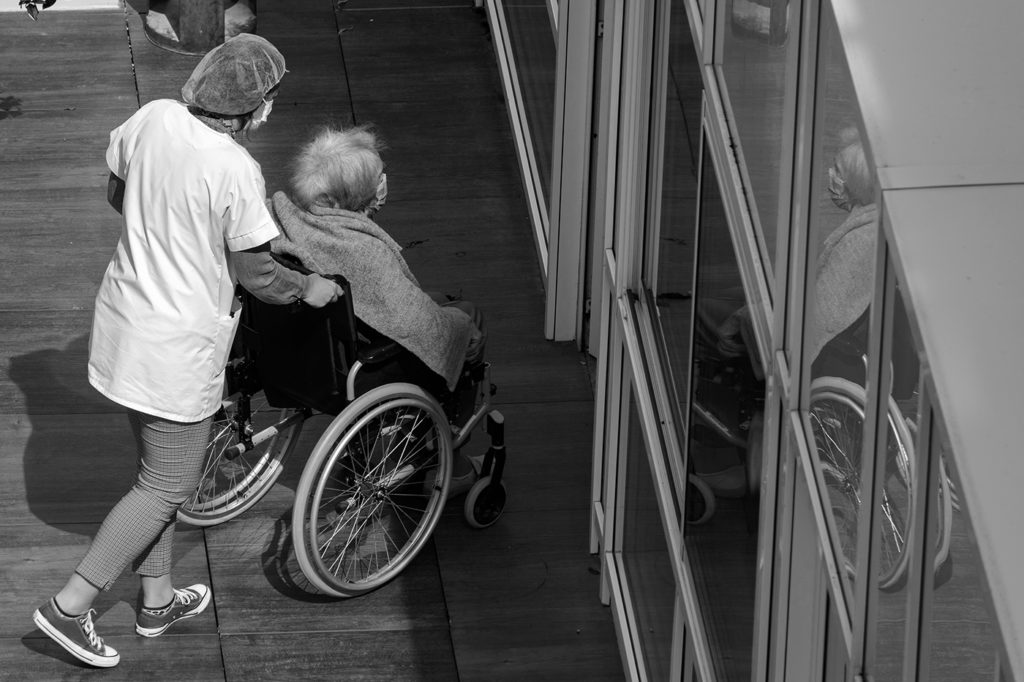One morning last month, the newspaper arrived on my doorstep with a front-page story reporting that the coronavirus had struck a nursing home in town. More than twenty-nine residents (out of about a hundred total) had tested positive, and two had died.
I know the place well. My friends in the Sant’Egidio Community and I have visited there weekly for eighteen years. The residents are our friends. We talk with them about their lives, and we sing and pray with them.
It is well known by now that the coronavirus eyes nursing homes as its softest target. When the virus infiltrates a nursing home, it spreads rapidly and indiscriminately among the close-quartered residents, rendering the facility an infernal trap. Thus, the elderly make up a large share of the 1.3 percent of COVID-19 patients who die. One third of coronavirus deaths in the United States—and possibly many more that have been unreported—take place in nursing homes. In Europe, the share is one half.
Added to the resultant fear is isolation. To protect their residents, nursing homes must lock down and shut out visitors, including family. If the virus arrives, residents are confined to their rooms, without exit, left to hope that it might pass them by.
Start your day with Public Discourse
Sign up and get our daily essays sent straight to your inbox.Our local nursing home has not disappeared from the front page, which reported more recently that ninety-four residents and thirteen employees have now tested positive and that twelve have died. We try to reach our friends. With the help of staff, we arrange a video chat. We send cards with greetings and prayers. We find out that Donald is in the hospital. He has tested positive for the virus, but is this why he is in the hospital? Nobody can tell us. We cannot visit him. Finally, we manage to contact him via telephone.
A Rhetorical Arms Race
Meanwhile, as I toggle between radio stations while driving on short errands and between cable news sites on the internet, I behold an arms race of rhetoric among our national leaders and commentators. After what seemed a moment of unity against a common impersonal foe, we are back to red vs. blue, conservative Christians vs. liberal secularists, President Trump vs. his enemies. Things have come to a head over reopening the economy.
The cautious closers, who have coalesced on the left, warn that reopening rapidly will accelerate the spread of the virus, cause thousands of additional deaths, and result in the need to shut down again soon. They seem to think they are not being heard. Click, reload, and fire. They charge that their opponents are willing to kill for the market.
Rapid reopeners, who have gravitated to the right, retort that one is not a greedy capitalist for wanting to mitigate 14 percent unemployment, food emergencies, and the closing of thousands of small businesses. Even when denominated in human lives, they say, the policy calculus does not yield closure. Hospitals prioritizing COVID patients have postponed cancer diagnoses, critical elective surgeries, and treatment of heart attacks; victims of emergencies have forgone calling 911; and economic hardship begets thousands of suicides and drug overdoses. Click, reload, and fire. Their opponents are cold to this hardship, aim to reassert a managerial state, and are trampling on liberties.
If one can duck the flying rhetorical bullets, one can hear simple and sincere cries for justice, claims about what we owe one another when pandemic strikes, on both sides. These cries turn combative, and the good sense in them is drowned out when life and death, and an imminent election, are at stake. The combat has become so vicious that former President George W. Bush saw fit to produce and post a Hallmark card–style video reminding us that “we are not partisan combatants. We are human beings, equally vulnerable and equally wonderful.” The words escalate. Click, reload, and fire.
A Message of Justice—and Mercy
What does the church have to say? Christian bloggers sometimes replicate the rhetoric, as when they debate suspending worship services and mass. Rapid reopeners accuse cautious closers of capitulating to the secular state and are met with accusations that they are cruelly callous to life.
The Christian church also carries a message of justice, though, that might propose a promising and unifying path were it not drowned out. Justice pervades the Bible, where it means living according to the demands of right relationship in all realms of life. The duties that make up this justice revolve around respect for the image of God in every person. Some of these norms take the form of absolute prohibitions, such as several of the Ten Commandments: do not murder, do not lie, do not steal. At the Second Vatican Council, the Catholic Church set forth a series of negative prohibitions of evils prevalent in the modern world, including euthanasia, genocide, abortion, torture, slavery, human trafficking, and subhuman working conditions. Other duties of justice involve positive action, and the Bible is open-ended about exactly how they ought to be carried out. Quintessential is the duty to care for the needy. The Old Testament teaches care for the widow, orphan, alien, and poor, and in the Gospel of Matthew, Jesus teaches that at the Last Judgment he will ask everyone if they recognized him in the hungry, the prisoner, and the stranger.
These positive, open-ended duties of justice converge with another virtue that is central to the Bible but is rarely heard on Fox News or CNN: mercy. “Mercy. Christianity. The two words are practically interchangeable,” Fr. Patrick Briscoe, O.P. recently wrote, in a reflection on the virus. In the modern world, the meaning of mercy is narrowed to exceptions to strict justice, such as when a judge waives punishment for a defendant. In the Christian tradition, by contrast, mercy is far wider, involving compassion for the distress of another and the resulting will to alleviate that distress. Jesus manifests this mercy most fully through his death and resurrection, and he tells us, “Be merciful, even as your Father is merciful” (Lk 6:36).
What do Christian justice and mercy offer for confronting the pandemic? What they do not offer is a clear answer to the question of reopening. Contrary to the weaponized words of both sides, neither side proposes to kill or to destroy intentionally. Intrinsically evil actions are not at the center of the debate. Once we acknowledge our widely shared desire to save both lives and livelihoods, the question becomes one of strategy—how much? how fast? in what manner?—and the answers depend on assessments of risk, weighing of trade-offs, judgments about past experience, and evaluations of scientific models, which are often at odds with one another, sometimes wildly.
Protecting—and Seeing—the Weakest Among Us
Justice, though, in the Bible and in the Christian tradition, is not only a matter of maximizing aggregate goods. Even more, it is a matter of protecting and remembering every vulnerable and isolated person, made in the image of God. As reopening moves ahead, as it will this week, next week, or the week after, this justice demands strenuous efforts to shield the people most at risk. Nowhere are they more at risk than at nursing homes and other sites of close-quartered confinement like prisons and homeless shelters. While a rapid reopening of the economy may pose new risks, we ought to remember that the gargantuan numbers of deaths at nursing homes in the United States, Europe, and elsewhere have taken place over the last couple months—the period of maximal quarantine.
Far more important than the timing of reopening is the extent of our efforts to protect the residents of confined facilities, efforts that heretofore have been wholly inadequate. What is needed are continued quarantining of these facilities; nationally coordinated, repeated, large-scale testing of all residents and staff in every nursing home; isolation and effective treatment of patients; the provision of high-quality medical care; and the full communication of residents’ medical conditions to their family members and authorized caregivers. Protecting the weakest is not one goal to be balanced against the other goals but a priority whatever else is pursued.
A justice that recognizes the worth of each person and the mercy that alleviates distress, though, involves something more—not just seeing to the protection of the needy but also seeing them. Long before the pandemic, Pope Francis spoke often of his favorite novel, The Betrothed, by the nineteenth century Italian Catholic author, Alessandro Manzoni, which depicts a seventeenth-century Capuchin priest, Fra Cristoforo, who visits the victims of a plague in Milan’s quarantine zone, contracts the disease, and dies. Today, we read of health care workers and first responders who venture into zones of infection to care for virus patients. Fr. Briscoe tells of fellow Dominican priests who reordered their common life in order to visit pandemic patients. A bishop in Brooklyn stopped to help a man coughing on a sidewalk and caught COVID-19.
For most of us, mercy will involve littler efforts. Alleviating the isolation of nursing home residents, thousands of whom will live behind locked doors perhaps for months to come, is one sort. Word of our friends at the local nursing home reached students in Mexico and Colombia, who visit this home every summer when they travel to Notre Dame for a summer educational institute. The students responded with a video featuring a virtual choir singing “Dona Nobis Pacem” as a greeting to the residents. Cards, calls, and video chats can infiltrate the walls of nursing homes as well as a virus can.
A surge of mercy to protect the elderly and others who are confined might prove a healing tonic, both for our bitterly riven society and for the Christian church. The church is riven by its own factions, and its credibility, especially in the Catholic case, suffers on account of its sex abuse crisis. Across its entire history, the church has realized renewal through acts of mercy that reenact the act of mercy that founded it.
















